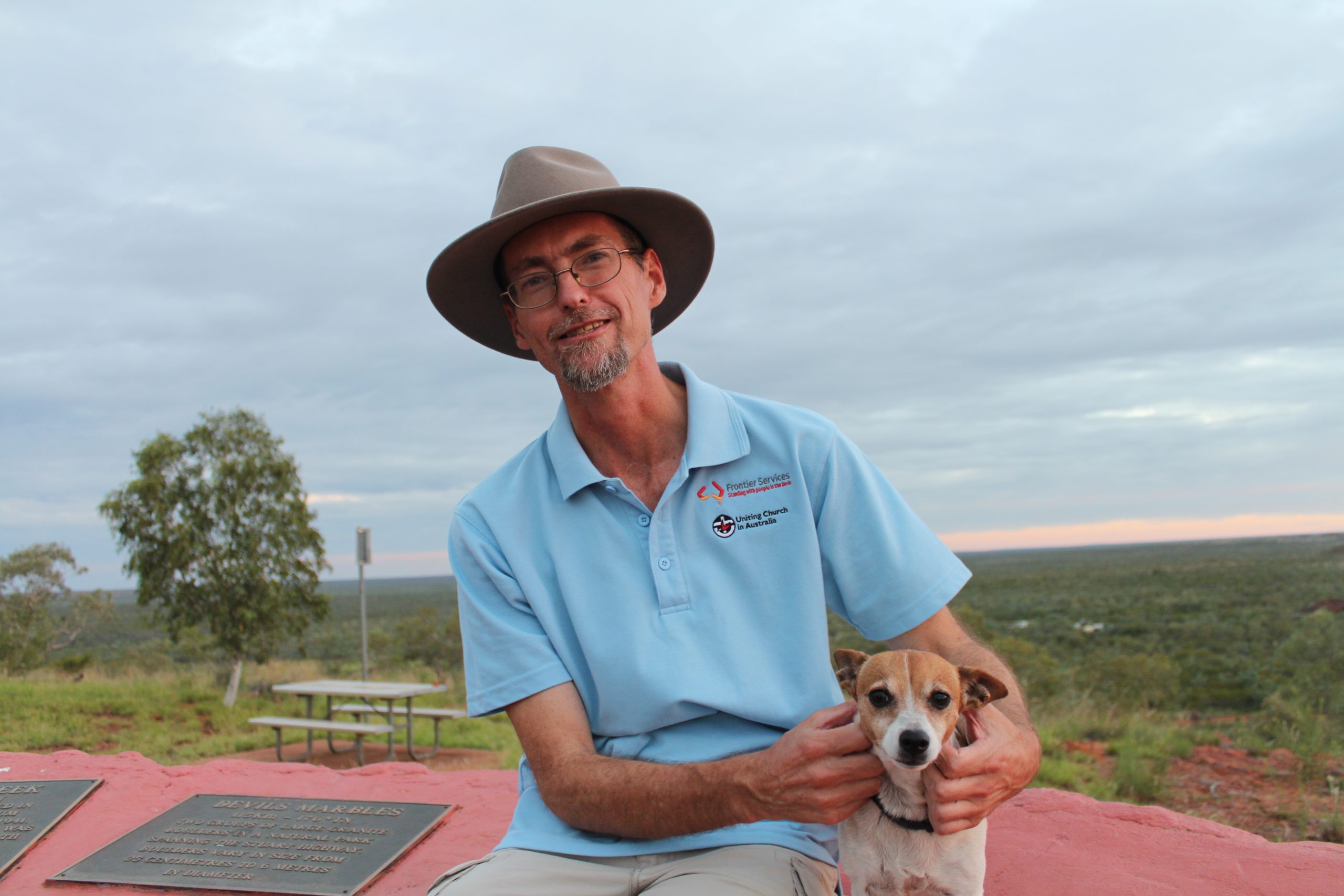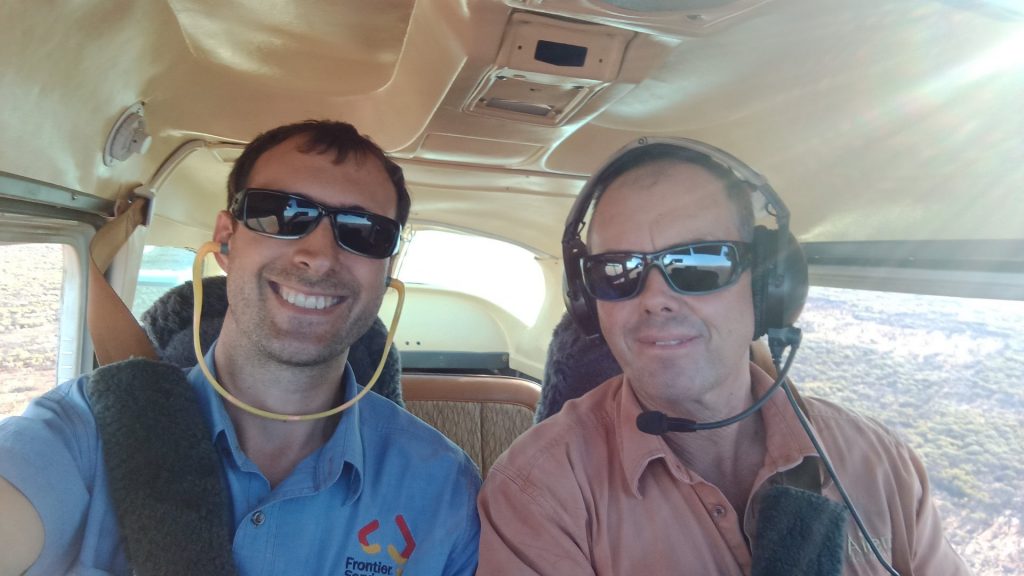
Chaplaincy in the midst of coronavirus
Quarantine, isolation and border controls throughout this year have had an impact on the work of our Frontier Services Buch Chaplains. But they’ve continued to find ways to reach out and connect with communities across Remote Australia. We chatted to Benjamin Quilliam and Peter Wait who work in the Centralian and Tennant Barkly regions of the Northern Territory about chaplaincy in the midst of Coronavirus.
Can you tell us a little bit about what being a Bush Chaplain in your Remote Area involves?
Benjamin Quilliam, Centralian Remote Area: It means that I’m always busy. I don’t think I’ve yet had a normal year as a Bush Chaplain. There’s always some big project going on that takes up my time. In recent years I’ve been involved in trauma healing workshops and church restoration projects. And each year when The School of the Air hosts their home tutors conference I run a creche to look after the young children who come along with their parents. In previous years, my job has also been filled with travel. A lot of my pastoral work usually involves going out bush to visit people. But because of border closures and biosecurity zones that have been implemented during the pandemic, I haven’t been able to do that as much. Just last week I went down to Yulara for the first time since coronavirus to check on how people there were doing. Normally I’d be making those visits more regularly.
Peter Wait, Tennant Barkly Remote Area: There’s no such thing as a normal day in the job that I do. I’ve been working as the Bush Chaplain here in Tennant Barkly for seven years now. Tennant Creek is a town of just 3000 people. My job is really to support the community in whatever way I can. Just this morning I had a chat with three different people. That’s a big part of my job, just being here to listen when people in the community need to feel heard. Within the community here in Tennant Creek I’m also heavily involved with the community op shop. We had to close temporarily during lockdown but now we’re back up and running. Recently, I’ve also been able to get back out on the road after coronavirus restrictions were eased. I made some good contacts while I was visiting both Katherine and Darwin. I’m hoping to build on those contacts in future. A lot of the job is touching base with people in that way and making sure that they know that I’m here to support them or connect them with other services that can assist them.
What did you have to change about your Bush Chaplaincy to adapt to coronavirus restrictions this year?
Benjamin Quilliam: I’ve pretty much transformed myself into a technical support officer. We’ve been wanting to find a way to put the Alice Springs church services online for a while and when people’s movement was restricted it gave us the perfect opportunity to do that. I bought some streaming gear, a laptop and camera to be able to set us up online. My congregation and Rev. Peter Wait’s congregation in Tennant Barkly came together to attend those online church services. But we wanted to make sure that people still got to connect with each other in isolation rather than just attending a church service. So we also began a weekly Zoom catch-up to allow the congregations to have an informal chat after the service.
In addition to that, I’ve been providing support to various organisation in the area to help them transition online too. I’ve been making videos and resources to help the Central Land Management Association to move onto Zoom. And we had planned to livestream the Harts Range Races but thankfully we ended up being able to have the event after restrictions were eased.
Restrictions also meant changes to events like funerals. There was quite a large backlog of funerals in Aboriginal communities across the area because of the need to transport bodies back to country to conduct sorry business. In some instances we’ve also been able to support those communities in live streaming funerals so that family members could be involved in the ceremonies despite border closures.
Peter Wait: In April our churches were shut as a precaution during the coronavirus pandemic and biosecurity zones were implemented which meant that I couldn’t leave Tennant Creek. My congregation here linked up with the Alice Springs congregation to have church services. Thankfully our biosecurity zones were lifted on the 24th of May and we were able to resume worship in person. Since then I’ve been able to get back on the road. Over June and July I went on four different trips. Because tourism has dropped off significantly with the ban on international travel, the roads have been unusually empty. The surprising result is that I’ve had some delightful conversations with the locals. I’m hoping to continue doing more of that.

How did your community respond to the challenges of 2020?
Benjamin Quilliam: The people here have faced all sorts of challenges this year.
The lack of rain continues to weigh on people’s minds. Much of the community is still experiencing drought and the stress of that hasn’t stopped.
The tourism industry in Yulara has also been hit hard by the pandemic with two thirds of the staff there being let off because of lack of work. And smaller tour operators are also feeling the pinch because there’s no income and they don’t have the option of shutting down and waiting it out until the end of the pandemic. Most of us have also experienced the practical challenges of supermarket shortages.
Stress levels in the community have been quite high. Particularly for families whose children are completing their schooling interstate or away from home. The changes in border restrictions and the fear and uncertainty has really affected lots of people.
Peter Wait: The biggest change in the community here has been the noticeable lack of tourists. For example, when I was recently in Darwin every second sink in the caravan park had been disabled to make sure that people were following physical distancing rules. So in that way, people have experienced some modifications to their everyday lives but we are attempting to function as “normal”.
In the early days of restrictions we experienced a shortage of food and supplies but for us that’s been an ongoing issue after the local supermarket burned down. The community has had access to a pop-up supermarket and we briefly experienced some issues with our supply chains due to the border closures and travel restrictions. But it never got as bad as in some places where there were runs on toilet paper and other essential items.
How did you stay connected with other clergy so that you could continue to support your community?
Benjamin Quilliam: It’s been really interesting to think about what we can learn from this year about how to be better Bush Chaplains. In the early weeks of the pandemic I was connecting with Rev Peter Wait once a week to support each other. And having our congregations join together was really helpful for both of us. But I think it’s also important to remember that this year has given us all an opportunity to think about what we can change and what we can do better. I’m looking forward to being able to catch up with the other Bush Chaplains and see what we can do going forward.
Peter Wait: I’ve been involved in meetings where the leaders and representatives of different denominations meet to discuss how we can best work together in the community. Normally we meet for coffee and a chat but when the restrictions were brought in we had to change how we were meeting. We share information so that we can find ways to provide pastoral care in a compassionate and understanding way.
What are your hopes for the community heading into 2021?
Benjamin Quilliam: I’m definitely hoping to have the opportunity to get back on the road again and visit people because I’ve missed doing that. I also want to touch base with some of the tourist towns and roadhouses and offer some practical support. I want to be able to show the community that I recognise how difficult his year has been for lots of people. And that there are still people who care about them and want to be involved in recovering from such a massive loss for them.
Peter Wait: Life is always uncertain and we will all hang in there and get through it. There’s still lots of joy in the world. Just last week I had a cup of tea with a couple that I married earlier this year and soon I’ll be officiating another wedding. So I still have things to celebrate and look forward to.
And in the end, no matter how terrible the world seems I remember that when I get up in the morning the dog will still want to get walked.
This article was adapted from the November 2020 edition of Frontier News.


